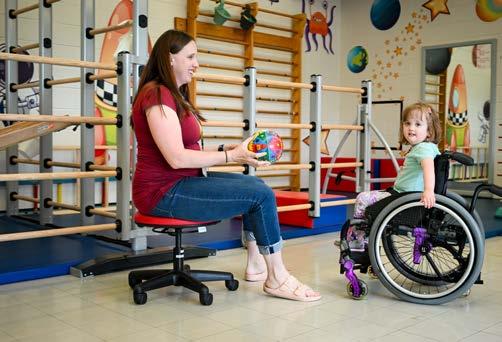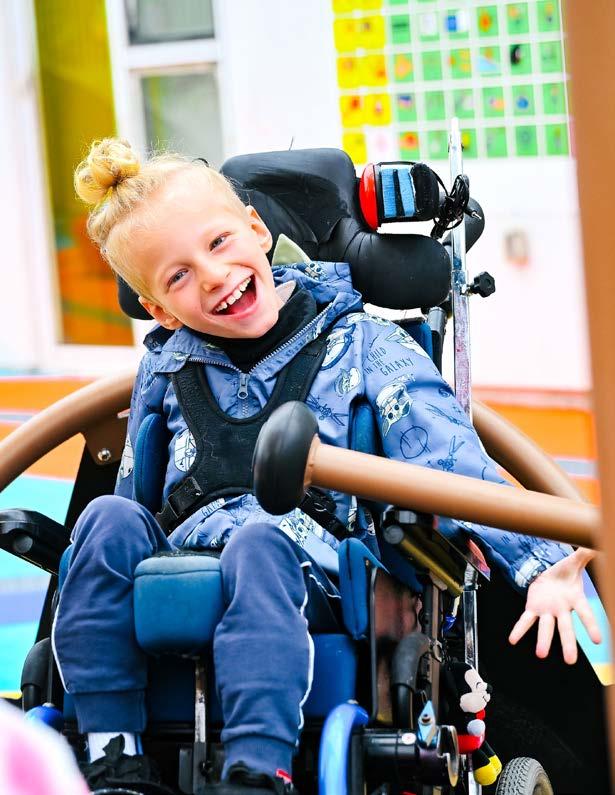

Letter from our Executive Director
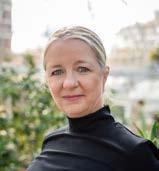
Dearest friends,
Though it feels like just yesterday that I sat down to write last year’s annual letter, I come to you today with much to report.
To begin, the Board of Directors recently named Matthew Chausse as the foundation’s new Chair. Matthew is long-time Board member and committee volunteer, and I am thrilled and grateful to be working along side him in his new leadership role. I encourage you to hear from him in his own words, at right.
I would also like to offer my deep appreciation to outgoing chair Kippy Wiegand who, to our great benefit, will continue being actively involved in the foundation’s work. During his tenure, Kippy led with integrity, intelligence, kindness and humour. It has been my privilege to work and learn from him.
In addition to leadership renewal and our fulfilling work of friendship building, fundraising and granting, we invested this year in looking inward and in planning for the future. And so, after months of consultations, self-reflection, and deep conversations, it is with great excitement that I announce the completion of Habilitas Foundation’s new comprehensive strategic plan.
This plan is more than just a roadmap for the next few years; it’s a reflection of our commitment to continue leading the charge in support of people living with physical disabilities, and to embrace change and renewal with the same passion and dedication with which we honour our roots.
Together, we will continue to uphold the values that define us, and work in service of a world of increased accessibility, equity, and inclusion for all people living with physical impairments and their support network.
Thank you for the role you’ve played in our story so far, and for joining us on this exciting new chapter. Your belief in our mission empowers us to push boundaries, embrace renewal, and step boldly into the future. I look forward to our continued good work together.
With gratitude, Theodora Brinckman

Message from the Foundation leadership
Kippy
Outgoing Chair

Now that my term as Chair of the Board of the Habilitas Foundation has concluded, I’m grateful for the opportunity to reflect on these last seven years. Serving in this role has been an incredible journey, and I am lucky to have been able to collaborate with so many impressive individuals and organizations.
Over the years I’ve witnessed the profound impact of our collective efforts. The work we support touches people of all ages, cultural and socio-economic backgrounds, and medical realities. I’ve witnessed first-hand how our foundation’s team, and the teams of the organizations we fund, unite in service of those living with physical disabilities and sensory impairments. No matter the diversity of need, our focus has been singular: bringing the best therapy, programming, resources, opportunities, and support to those who need it.
As I pass the torch and title of Chair to Matthew Chausse, I’m filled with optimism. Our foundation is robust, our leadership steady, and our mission clear, and I have every confidence that under Matthew’s leadership our foundation will continue to thrive.
Though my time as Chair has come to and end, I have every intention of continuing to work with the Habilitas Foundation, and I look forward to many more years of shared successes.
To all involved – board members, staff, donors – thank you for the trust and support these last years. It’s been an honour.
KIPPY WIEGAND
I’m honoured to be stepping into the role of Chair of the Board of the Habilitas Foundation. Over the years I have served on the Philanthropy Committee, as Chair of the Allocations Committee, and as Treasurer of the Board. I have enjoyed and learned from each position, and I am keen to continue furthering Habilitas Foundation’s mission and supporting our team in this new role.
Thanks to my predecessor’s leadership, the generosity of donors, and the expertise of our partners, the Foundation has accomplished many great things. I feel fortunate to have been a part of these past successes and am committed to continuing my efforts toward building a world of increased access, equity, and respect for people living with physical disabilities and sensory impairments.
With your ongoing support and involvement, I know we can make a lasting difference in the lives of those we serve, and I look forward to working alongside you.
Matthew
Chair of the Board
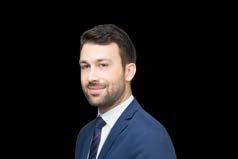
Your feedback and ideas are invaluable to us as we continue our work, particularly now as we move forward invigorated by our refreshed strategies. I encourage you to reach out to us with any ideas you’d like to share.
With thanks to the Board for this immense opportunity, and to you the donor, who makes everything we do possible. MATTHEW CHAUSSE
Inspired & Inspiring
An inclusive playground for every child
We all remember how exciting playground time was at recess or after lunch in elementary school. The feeling in your tummy when your friends pushed you really high on the swing. That sense of triumph after you’ve conquered the slide for the first time. And the many adventures on the climbing wall and the merry-go-round.
It was a chance to run, to play with other children, to blow off steam, and to just be a kid.
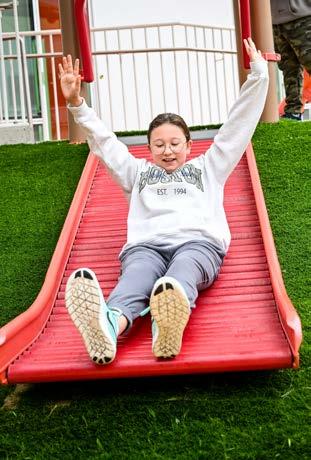
After years of waiting, the children of Mackay Centre and Philip E. Layton schools finally have their very own playground. One that is fully accessible, so that every child will be able to learn, laugh, and play – irrespective of their different abilities.
In 2019, these specialized schools moved into a brand-new building located in NDG that they share. The modern and fully adapted facility has everything, including the latest technology for classrooms, an accessible pool, a wheelchair repair room, as well as state-of-the-art therapy rooms and equipment.
The only element missing was a playground.
Inspired to create a unique playground especially for the exceptional children of these schools, Habilitas Foundation launched the “Every Child Has A Right To Play” capital campaign. Under the leadership of campaign co-chairs Pierre Boivin and his daughter Catherine (herself a former student of Mackay Centre School), the community generously embraced the project with more than $3 million in donations.
On September 25, the ribbon was officially cut, and the children had their first chance to discover all that the playground had to offer. The smiles and laughter truly say it all. The wheelchair-accessible swing and merry-goround, the chimes and drums, the slides and climbing wall were all highlights that captivated the children.
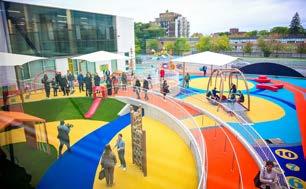
Violette, grade 5, tries out the new slide, fabricated with materials that don’t interfere with hearing aids and cochlear implants
“The key word in our playground is ‘inclusive.’ It’s great seeing all the children playing together in this amazing playground that truly gives every child an equal opportunity,” says Irini Margetis, principal of these two schools. “Many of the children in our schools don’t have the opportunity to go to the park with their parents and family. Now, we can give this to all our students every day.”
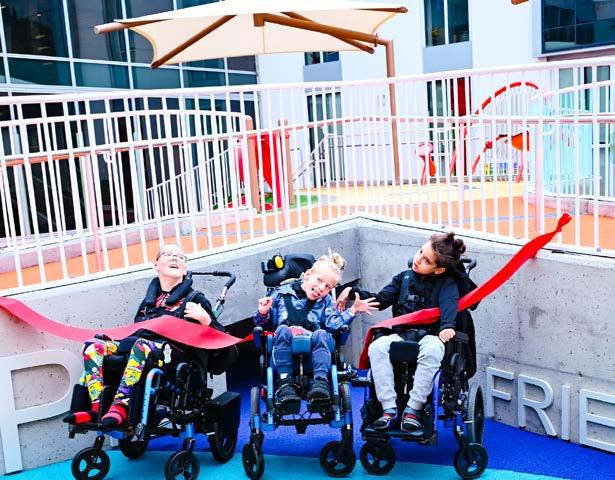
Arlene Rosenberg, physiotherapist with the rehabilitation team in the school, recognizes the many clinical benefits that were considered in the design and selection of the various play structures. “The playground offers therapists a unique opportunity to work with the children in an environment that is adapted to their needs, while still being engaging and fun. As a physiotherapist, I’m especially excited to work on skills such as coordination, movement and balance with the children in this unique setting.”
Habilitas Foundation acknowledges all the work that went into planning and building this one-ofa-kind playground, as well as the generous and compassionate donors who helped make this dream a reality for the children in this special school.
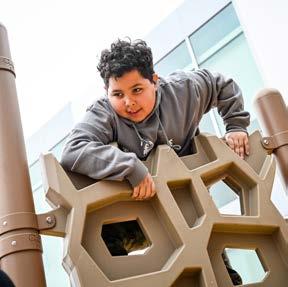
Ryan, grade 5, on the new adapted climbing wall, which will also be used for motor planning and physiotherapy training
Bennett, Aiden and Maurice from the Augmentative Communication Class, cutting the ceremonial ribbon
Jefferey
The power of creative writing
In a world where appearances often overshadow deeper truths, individuals living with visible disabilities can struggle to be recognized for the full richness of who they are.
The Action Centre exists as a beacon of inclusivity and empowerment, offering not only a physical space, but a thriving community where members are seen, heard, and celebrated for all that they bring to the table. Here, individuals living with physical and cognitive disabilities find connection and growth through supported workshops, social gatherings, cultural outings, life-skills training, and so much more.
One of the most inspiring new additions to the Action Centre’s offerings is the creative writing program. Led by the talented Kate Lavut—a graphic novelist, playwright, and teacher—this weekly workshop opens up a world of expression for participants, inviting them to explore the topics and issues closest to their hearts. The program is designed with everyone in mind, but it holds a special significance for those whose disabilities make verbal communication more challenging.
The atmosphere in Kate’s workshop is gentle, supportive, and low-pressure, where the focus is on creativity and connection. There’s no expectation to share, but many participants choose to, leading to heartfelt group discussions that deepen understanding and foster camaraderie.
“At first, the participants were concerned about sharing their pieces,” Kate explains. “But as they got to know each other and became more comfortable, they began expressing themselves more personally than they did at the start.”
What makes this program truly special is its organic approach. There are no strict rules or formal critiques; spelling and punctuation take a backseat to the freedom of expression. Instead, the focus is on the content and on allowing participants to express themselves freely and without fear of judgment.
Through the act of collective sharing, participants are given the opportunity to have their experiences acknowledged by others, and to offer validation and support to their peers. Now, less than one year in, the program has already extended itself past the walls of the Action Centre and into the broader community with the publication of “Unbent”, a collection of works by workshop participants.
Jefferey, who acted and sang before his disability, is just one of the Action Centre members who was able to discover his inner voice through this new program. “Because of his limitations, Jefferey is unable to type manually,” says Kate. “He dictates his pieces, and we write them down. Jeff thinks about what he’s saying. He chooses his words, chooses the line breaks. He’s always thinking it through, and it’s exciting to watch his style develop.”
Kate believes that works like the one presented at right by Jefferey will help shift the way society views people living with physical disabilities.
I think this will open people’s eyes. Many assume that just because I’m in a wheelchair, I can’t be smart or capable. But if they read the collection, they’ll see that intelligence and creativity aren’t tied to physical ability. I might be in a chair, but my mind is still sharp. I feel, want, and dream just like everyone else.
- JEFFEREY
UNBENT
A piece from Jeffrey
When people look at me, They see a man in a chair, a man to be pitied.
But what I really am, Is a man of ideas, a man who could explode with creativity.
Also, a man who’s like iron. A man who doesn’t yell, a man who never bends
A man that you can’t tell what to do
He’ll tell you…
If you pity him, he’ll just pity you.
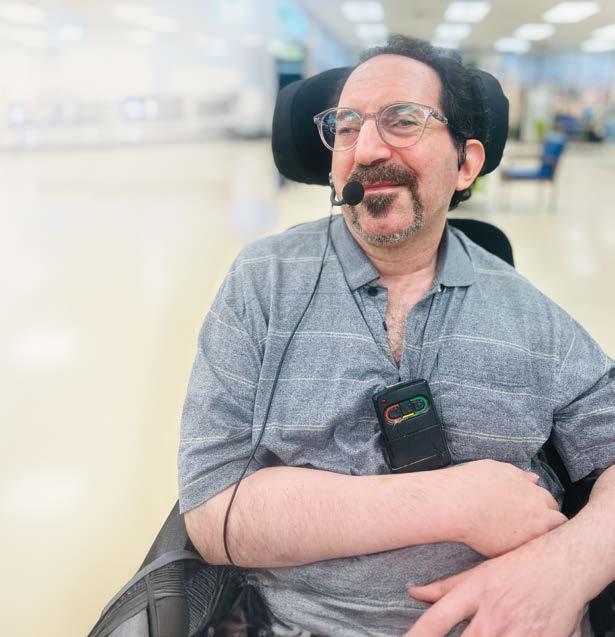
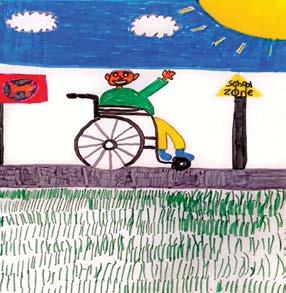
For over two decades, the Action Centre has offered a secure and inclusive space for adults with mobility challenges. Thanks to the generosity of donors, the Habilitas Foundation continues to advance the centre’s mission, bringing purpose and dignity to countless individuals with physical and cognitive disabilities.
Alyah MAB-Mackay:
A new wing that reflects the warmth of services for deaf and hearing impaired children
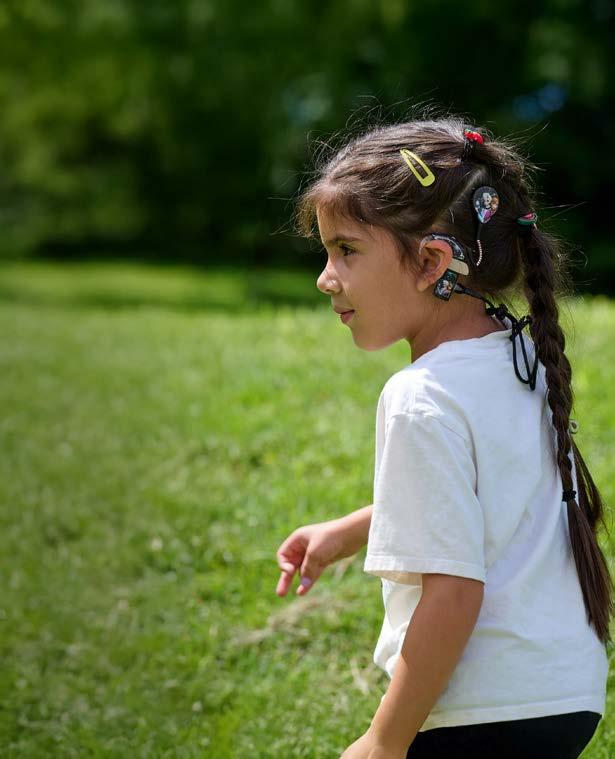
Born severely deaf, seven year-old Alyah received her first cochlear implant at the age of 18 months. Since then, Alyah and her parents have been regular visitors to the MABMackay, where she receives ongoing therapy and support. Despite the family’s long history with the centre, when they arrived for their appointment this summer, they had to check twice to make sure they were in the right place.
When they got off the elevator, they were surprised to find themselves in an immersive new forest-like environment, featuring a tree whose branches held books and stuffed animals, a ceiling that mimicked the sky, and walls adorned with woodland and farm animals. The hallways leading to the therapy and testing rooms had also been transformed, designed to engage the children’s imaginations and create a warm, welcoming, and anxiety-reducing environment.
Learn about the many others impacted by your generosity. Read their stories here:

For more than 100 years, the MAB-Mackay has developed a full range of services for children who are deaf or have hearing impairments, including auditory training, speech-language pathology, music therapy, American Sign Language (ASL) training, outfitting and service of hearing aids and other assistive listening devices, and intensive cochlear implant rehabilitation.
Thanks to the generosity of donors and the input from the centre’s professionals, Habilitas Foundation was able to breathe new life into what had previously been a functional, but unremarkable space.
“Families often experience a multitude of feelings when first confronted with their child’s diagnosis, and most will visit the centre often for follow-up care and rehab. Having a warm and welcoming department helps to ease the process for everyone during what is often a stressful and overwhelming time,” says Tara Millman, an audiologist at the centre. “The children are more excited to be there for their appointments, and parents feel more at ease.”
All children, in particular those with hearing impairments, are intensely visual and rely heavily on their physical surroundings to help build their understanding of any given situation. Some children feel particularly stressed and anxious in settings that seem institutional, especially if they have had difficult medical experiences in the past.
The newly enhanced space sets a tone of joy and wonder that promotes relaxation and primes the children for learning, and reflects the positivity, hope and opportunity that drive the therapy sessions. The new environment also features a mural of the American Sign Language alphabet, and a threedimensional learning wall designed to help teach the matching of sounds to everyday objects and animals. Even the lighting and softened acoustics were specially designed to respond to the needs of these children.
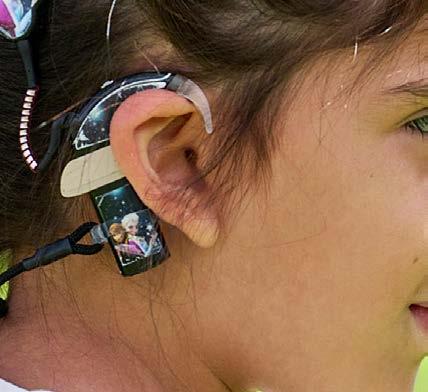
“When Alyah was younger, it was difficult to
communicate with her.
Through our work with the MAB-Mackay and her resulting improved access
to sound, our daughter is now able to have real conversations and express herself as an individual,” says her father Sebastien. “She has become a real go-getter and has more confidence in herself. As a parent, there is nothing more important.”
Each year, close to 400 babies, children and young adults who are deaf or have auditory impairments are cared for at the centre, at no cost to their families. Habilitas Foundation funds essential programming not covered by the government, such as music therapy and ASL training, as well as important technology for audiological evaluations, and transformative projects such as this one.
Ryan A summer sanctuary like no place on earth
For the past ten joyful years, this fully adapted summer camp has been Ryan’s summer sanctuary, a place where he feels truly at home.
Ryan is a passionate sailor, an enthusiastic waterskier, and an avid sledge hockey player. He has a green thumb for gardening, a love for animals, and a magnetic personality that makes him well-loved by all who know him. Ryan also lives with cerebral palsy and scoliosis. Despite being non-verbal and reliant on a wheelchair, Ryan’s boldness, humour, and zest for life shine through.
Raised in a “no-nonsense, no-fear” environment, Ryan has always just assumed that everything was as possible for him as it was for his able-bodied brother.
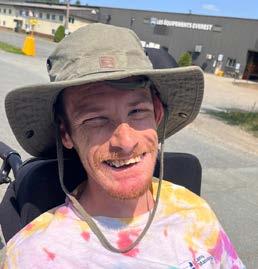

Twin brothers Ryan and Jonathan share many things, as twins often do. But while Jonathan spent his summer out west in BC, enjoying the activities typical for someone his age, Ryan found himself back at his favourite place on earth: Camp Massawippi.
“When he was younger, he didn’t realize that camp wasn’t the norm,”
Ryan’s mother Jacky reflects.
“He just assumed that everything was as possible for him as for anyone else. Different maybe, but possible.”
The realization that the world isn’t always designed to support your success is significant and difficult. This is why Camp Massawippi holds such a special place in the hearts of its campers.
Camp Massawippi is built, run, and staffed with campers of various abilities in mind. With a staff-tocamper ratio of 3:1, and an environment where every detail—from sports to dining, dormitories to arts—is made as accessible and inclusive as possible, it’s no wonder this unique camp has been so beloved for more than 70 years.
Camp provides a precious respite for families like Ryan’s. With Ryan in a place he loves, surrounded by caring and skilled staff, they can focus on the parts of their lives that often take a back seat. This time to recharge is invaluable, and Jacky’s gratitude for the dedicated counselors shines through in her words;
“I
don’t know how they do it. It takes a very special person to work at Camp. I have no worries for his health or safety when he’s there. For his part, Ryan says that he’d go, every day if he could.”
Running a camp like this takes lots of resources. Habilitas Foundation believes that every youth deserves to experience the joy of a summer spent in nature, and the freedom to wake up in a world where possibilities are limited only by the number of hours in a day. Donor generosity is making this dream a reality, one camper at a time.
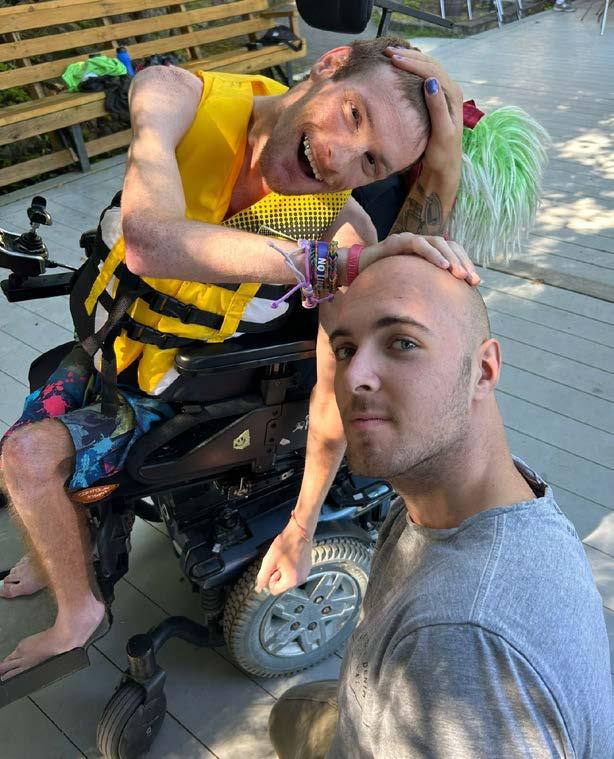
Do you have a story you want to share?

Carol The wonders of cutting-edge technology
“Our dad was an athlete at heart,” Caroline shares, her voice filled with both pride and nostalgia as she reflects on her father, Carol.
“He loved biking, exploring the world, and savouring meals with the people he loved most.”
But a few years ago, their world was turned upside down when Carol received the lifealtering diagnosis of ALS, also known as Lou Gehrig’s Disease.
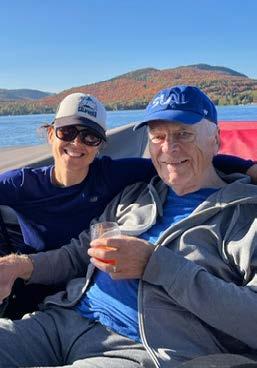
As the disease slowly progressed, simple tasks like writing a note, holding his head up, or even walking became impossible. That’s when the ConstanceLethbridge Rehabilitation Centre stepped in— offering not just support, but a roadmap towards independence and dignity.
The Centre provided Carol with a power wheelchair, giving him the freedom to move again, and introduced him to advanced communication technologies that became his new voice.
“It was so important to my father to be able to express his thoughts, connect with us, and just have moments of distraction,” Caroline recalls. As ALS took its toll on his body, Carol began losing strength in his voice, and soon after the ability to form and pronounce words. Soon he was unable to use his hands to operate his iPad, a key tool in his day-today life. But the team at the Assistive Technology Program at Constance-Lethbridge wasn’t ready to let that be the end of his story.
Olivier, Carol’s speech-language pathologist, introduced voice banking—an innovative technology that allowed Carol to preserve his voice synthetically before it was lost. As Carol’s hand function declined, Olivier trained him on eye gaze technology, empowering him to control his communication device using just the direction of his gaze.
“It was like we were giving him back his voice and his hands,” explains Olivier. “He could Facetime with his family, read the news, send e-mails, and even use his voice bank to communicate his most used phrases. It wasn’t just about communicating with others; it was about staying connected to life.”
For Carol’s family, witnessing the profound difference these tools made in their father’s life sparked a desire to give back. In gratitude, they funded the purchase of the latest generation of communication devices, ensuring that others like Carol could continue to experience the joy of independence.
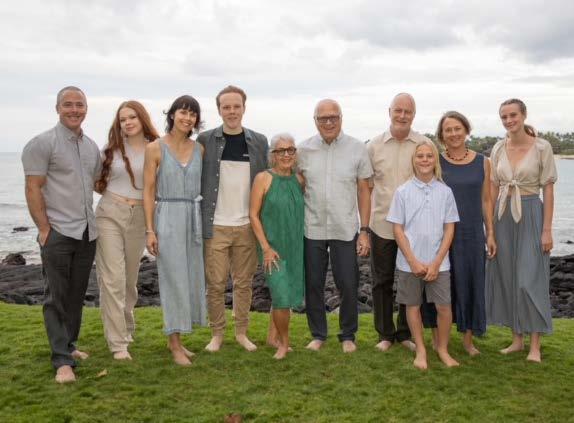
There are now incredible tools that can help people like our dad live fuller, richer lives,” says Caroline. “And with the expertise and compassion of professionals like those at Constance-Lethbridge, these technologies make a world of difference. We’re honoured to help ensure that others can benefit just like our dad did.
ABOUT THE TECHNOLOGY
Karen, an occupational therapist at ConstanceLethbridge, is just one of many who see first hand the impact of the family’s generosity. “Thanks to their donation, we’ve been able to acquire cuttingedge devices that we didn’t have before. Now, we can better assess our clients’ needs and train them on the technology that’s best suited to them. We even offer temporary loans while they wait for their own devices through the government system.”
It’s because of donor support like this that Habilitas Foundation is able to help elevate the quality of care at Constance-Lethbridge. Together, we’re not just providing services—we’re giving people with physical disabilities the tools they need to live with independence, dignity, and hope for a brighter tomorrow.
These technologies and tools help people with disabilities communicate and gain independence. Using advanced eye-tracking devices, users can control computers and tablets with just their eyes. This allows them to browse the internet, use apps, and even generate speech, all without needing to rely on traditional input methods like a mouse or keyboard. Whether through touch, switches, or eye movements, these tools can be tailored to fit the unique needs of each person, making it easier for them to interact with the world around them.
Morris Finding hope in the face of vision loss
At 74, Morris has spent nearly five decades by the side of his beloved wife, Hinda, building a life rich with love, laughter, and shared passions. Then, a little more than five years ago, their world was shaken when Morris began to lose his sight to macular degeneration—a condition that slowly erodes central vision, leaving only shadows, and the ability to see peripherally.
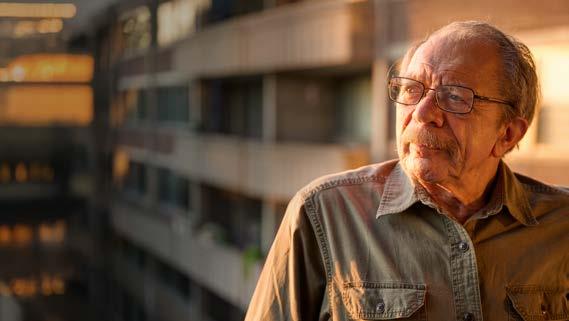
For Morris, the first signs were subtle—a bit of a struggle seeing the letters and lines of his cherished daily crossword. But the grey circle that marred his vision grew, making it harder to distinguish between numbers and letters, making fine lines difficult to see at all. His daily crossword was becoming nearly impossible.
His vision loss didn’t just take away his ability to read the books and technical magazines that once fueled his mind. It robbed him of his independence, forcing him to give up driving—something he’d loved, not just for the freedom it provided, but for the joy his spontaneous road trips with Hinda would afford. Surrendering his driver’s license was one of the hardest moments of his life; it felt like losing a piece of his identity.
When Morris was told that he had macular degeneration and that he would never fully regain his sight, he knew he would have to learn to adapt to his new situation. How does someone even begin to adapt to the loss of vision? Morris discussed this with his family, and they assured him everything will be all right, and of course, that they loved him. Hinda then got the referral for Morris to come to the MAB-Mackay.
From the very first phone call, things began looking up for Morris.
According to Morris, from the moment he stepped through the doors of the MAB-Mackay, he was met with warmth and understanding. “They welcomed me like I was a long-lost family member,” remembers Morris. “Everyone I met showed me compassion, empathy and respect. They really listened to me, and explained that while my vision wouldn’t get better, they could show me how to compensate and improve my quality of life.”

Morris and Hinda very kindly share their secret recipe for spaghetti sauce… Enjoy!
A vision rehabilitation specialist from the MABMackay visited Morris at home, taking time to understand his daily routines and the challenges he faced. Simple tasks he had taken for granted, like making coffee or using the toaster, had become problematic. But with gentle guidance, personalized training, and the addition of some simple tricks, Morris began tackling the business of his day-to-day life with a confidence he assumed would be gone forever.
One of the most daunting challenges he faced was learning to walk safely. Sara, his Orientation and Mobility Specialist, trained him on adaptive street crossing techniques so he could cross safely at intersections, even if he was unable to see the traffic lights.
In the kitchen, a space he and Hinda had previously spent so many happy hours together cooking, Morris found that he was able to comfortably and confidently resume his role as sous-chef, helping create their family’s secret homemade spaghetti sauce. The skills he learned at the MAB-Mackay (and easy tips like placing tactile stickers on appliances) have given him back not only some autonomy, but also intangible but life-affirming family moments like these.
For Morris, the MAB-Mackay was more than just a place to learn new skills—it was a lighthouse in a sea of uncertainty. It offered him hope, reassurance, and the strength to face each day with renewed confidence.
Morris’s message to others facing vision loss is simple but profound: Don’t give up. With the right support and care, he is certain, despite daunting challenges, that everyone can find new ways of approaching and living life to its fullest.
Last year, the MAB-Mackay provided support to over 1,300 people of all ages who are blind or visually impaired. Donor support helps make possible many essential services, including the low vision clinic, the Day Centre for seniors, the technical aids boutique, the optician and orientation & mobility specialists, as well as essential technology and facility upgrades.
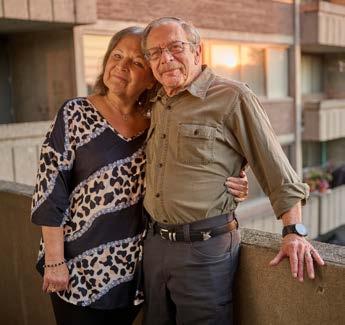
ORIENTATION AND MOBILITY
“When first starting with an O&M Specialist, the clients are often unsure, anxious, and unaware of what they can accomplish,” describes Sara, who has been training children, adults and seniors with vision loss for more than 20 years at the MAB-Mackay.
We work with them on stepping out of their comfort zones. We know how scary it feels to be at a busy intersection, waiting to cross. Accompanying clients through their struggles and successes builds a very strong trust.
With time and lessons, the clients start to learn that they’re capable of traveling in ways they never thought possible. It is very rewarding to witness them grow their confidence and believe in themselves.”
Camilla Teamwork makes the dream Work: A collaborative approach to therapy
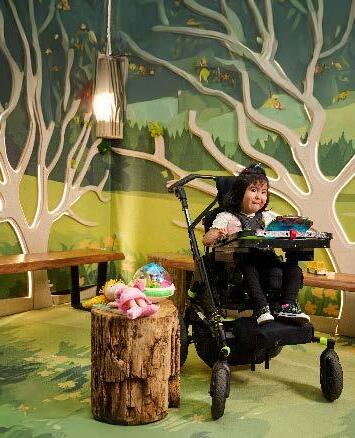
Working with children with multiple impairments requires a particular approach. We need to take into consideration both the physical and the emotional needs. It’s never simple, but it’s always rewarding. It’s hard work for everyone, but I’ve seen firsthand what can be accomplished when families have access to the support they need. Some children are truly unstoppable!
-
NANCY
Nancy, a pediatric physiotherapist at the MABMackay, works with babies and young children who have a combination of neuro-motor, vision and/or hearing disabilities – a situation often referred to more generally as having multiple impairments.
Frequently, these little ones will also have fragile overall health and significant developmental delays. Nancy, like all her teammates, combines compassion and expertise, to guide the children and their families through the most complex challenges, offering the care and support they so desperately need. “We often take tasks like eating and drinking, sleeping, communicating, moving about, and playing for granted. But for these children, these seemingly simple tasks are not so simple.”
The Multiple Impairment Program is unique to the MAB-Mackay, and offers families comprehensive, integrated care for their child from a dedicated team of professionals working across multiple disciplines. What makes this program so powerful is its collaborative, holistic approach, which focuses on nurturing each child’s developmental potential. By working together, the team helps open doors for children to integrate into daycare and school, while also enriching their overall quality of life.
Three-year-old Camilla entered the program in the winter of 2022, and since then, her progress has surpassed what her parents had ever allowed themselves to imagine possible. Despite facing challenges with vision and coordination, she has learned to reach for toys—a significant milestone that allows her to better engage with the world around her. Camilla delights in story time, actively turning the pages of her favourite picture book, and now, after hours of hard work and therapy, and thanks to the use of the customized gait training equipment adapted to her specific needs, Camilla has succeeded in taking her very first steps!
Camilla has benefited from other key services at the centre as well. The low vision clinic provided her with glasses specially crafted by the in-house optician, while the audiology department continues to ensure that her hearing aids are perfectly tuned, allowing her full and clear access to sound.
Additionally, Camilla continues her work with the saliva management clinic, working to improve her ability to swallow pureed foods. This next milestone will bring her closer to the goal of weaning off her gavage feeding tube.
Each of these steps, some more obvious than others, provides Camilla new opportunities for growth, connection, and an increasingly autonomous and fulfilling life.
“Another important part of our role is to support the child and family in their frequent hospital appointments, and to ensure the continuity of care at home and in the community,” explains Nancy.
Camilla’s mother credits the team for the incredible progress her daughter has made. “The MAB-Mackay truly understands the children they see. You don’t get this anywhere else. I feel fully comfortable being open and vulnerable with the team. I can share what’s happening in our life, and I know there will be no judgement. It’s a place where we feel truly accepted. It’s difficult to carry everything, and the MAB-Mackay team has made our lives easier by sharing the load.”
Generous donor support for the Habilitas Foundation makes it possible to sustain this one-of-a-kind interdisciplinary program. Thanks to this crucial funding, many specialized teams, clinics, advanced technologies, and custom equipment are available to give these unique children the brighter, more hopeful future they deserve.
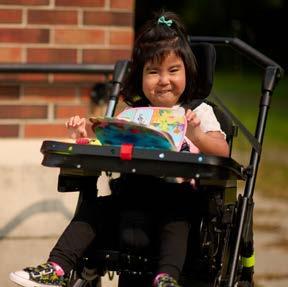
of the Blind
Dinner in the Dark Partnership with Quebec Federation
At Habilitas Foundation, our mission is to help build a world that is more accessible, inclusive and equitable. We achieve this by partnering with generous donors and like-minded organizations to ensure that those we serve have access to the best therapy, interventions, and technology available.
We also believe that awareness is the first step toward change. By shining a light on the daily challenges faced by individuals with physical and sensory impairments, we can inspire a society that values, supports, and treats everyone with the dignity they deserve.
That’s why Habilitas Foundation partnered with Quebec Federation of the Blind (QFB) during White Cane Week last February to co-host the inaugural Dinner in the Dark. This extraordinary evening of experiential dining offered guests the first-hand experience of what it is like for those living with low vision and blindness.
Upon arrival, guests were blindfolded, escorted, and seated in a darkened room at tables alongside visually impaired hosts. Throughout the evening, the hosts shared tips and tricks for how to navigate meals and socialize without the benefit of sight. They also offered insights into the realities of living in a world predominantly tailored for the sighted, as well as pointers on how sighted people can be better allies.
“We planned the evening in the hope that guests would leave with a better understanding of what it is to live with a visual impairment, as well as with some practical knowledge about how they can offer people with low vision or blindness support in a respectful and welcoming manner,” explains QFB President Lucio D’Intino.
Experiential, judgment-free education and awareness-raising is key to building public understanding and community-wide change, and we are pleased to announce that the 2025 Dinner in the Dark is currently being planned –stay tuned!
Founded in 1926, QFB’s mission is to offer recreational and informational programming to its members, including informational sessions and funding for post-secondary education, group outings, and community dinners. Habilitas Foundation is proud to support the QFB by funding its operations, and by contributing to its program offerings.
Lucio D’Intino, President of the QFB (front centre) and volunteers who helped make the soiree a success.
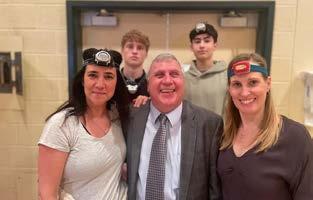
Lillian A Legacy of Love
There are many ways to support the Habilitas Foundation and transform the lives of people in our community living with physical and sensory disabilities. One powerful option is through a planned gift. This thoughtful choice lets you make a lasting impact on future generations while preserving your quality of life today. In fact, many find that by choosing to include a gift in their will, they’re able to be even more generous than they thought possible.

Recently, Habilitas Foundation learned of a lifechanging gift made by Lillian. Who was this generous woman, and why had she chosen to leave her beautiful legacy with us? Alan, a long-time friend of Lillian’s describes what motivated her to leave a portion of her estate as a lasting expression of her commitment to making a difference in the world.
“Lillian was born in Montreal to parents of Slovak descent and grew up in a house of modest means. I first met Lillian in the late 1970’s where we both worked in a local hospital. Lillian was a kind, loyal and generous person always willing to help and often the first to volunteer for the benefit of patient care. She devoted herself to others – it was simply a part of who she was.
And so, when her mother was declared hearing impaired, Lillian made sure that she received the best of care. Because Lillian herself worked with doctors and health care professionals, she understood how important quality treatment and consistent followup would be to her mother’s well-being. Lillian researched every option in the city, and the Mackay Centre (now known as the Lethbridge-Layton-Mackay Rehabilitation Centre) lived up to every standard she held. She was always by her mother’s side during her treatments, check-ups, and adjustments to her hearing aids.
Lillian spoke often and highly of the remarkable level of care and professionalism shown by the Mackay Centre and its staff. It wasn’t just the quality of the therapy and treatments that impressed her, but the genuine warmth and empathy of the professionals.
It came as no surprise to me that Lillian would choose to leave an important sum of money to the Mackay Centre. While not a woman of great means, Lillian was a true philanthropist. She believed in giving back to her community in any way she could, be it with donations of time or gifts of money. This final gift left in her will is a testimony to her values, and a reminder that our ability to do good in the world can extend beyond our lifetime.
Her decision to leave this gift was not just an act of philanthropy; it was a heartfelt gesture of gratitude, a way to honour an organization that had extended such profound kindness and expert care to her mother.
As a long-time friend of Lillian, I’m glad to know that her legacy, and by extension her mother’s, will live on in this way, and be remembered by a community that she herself thought so highly of.
- ALAN
If you’re interested in learning how you can leave a gift of lasting impact in your will, please reach out to Sean Zikman, Director of Philanthropy at sean.zikman@habilitas.ca or (514) 488-0043 ext. 51410 for a confidential conversation.
Habilitas Foundation’s mission is to empower, and improve the lives of people living with physical disabilities through philanthropy, partnership and leadership.
With experience and compassion, Habilitas Foundation partner organizations transform donor generosity into tangible and meaningful support for people living with physical disabilities and sensory impairments. The inspirational stories featured within this Impact Report are made possible through support like yours.
Thank you!
13% Action Centre
29% Camp Massawippi
Habilitas Foundation
7010 Sherbrooke St. West Montreal, QC H4B 1R3 514-488-0043 info@habilitas.ca
Learn more about our work at www.habilitas.ca
@habilitas.fondation fondation-habilitas-foundation @habilitas4037
5% Research
4%
Constance-Lethbridge Rehabilitation Centre
1%
Quebec Federation of the Blind
Your Generosity at Work
48% MAB-Mackay Rehabilitation Centre
